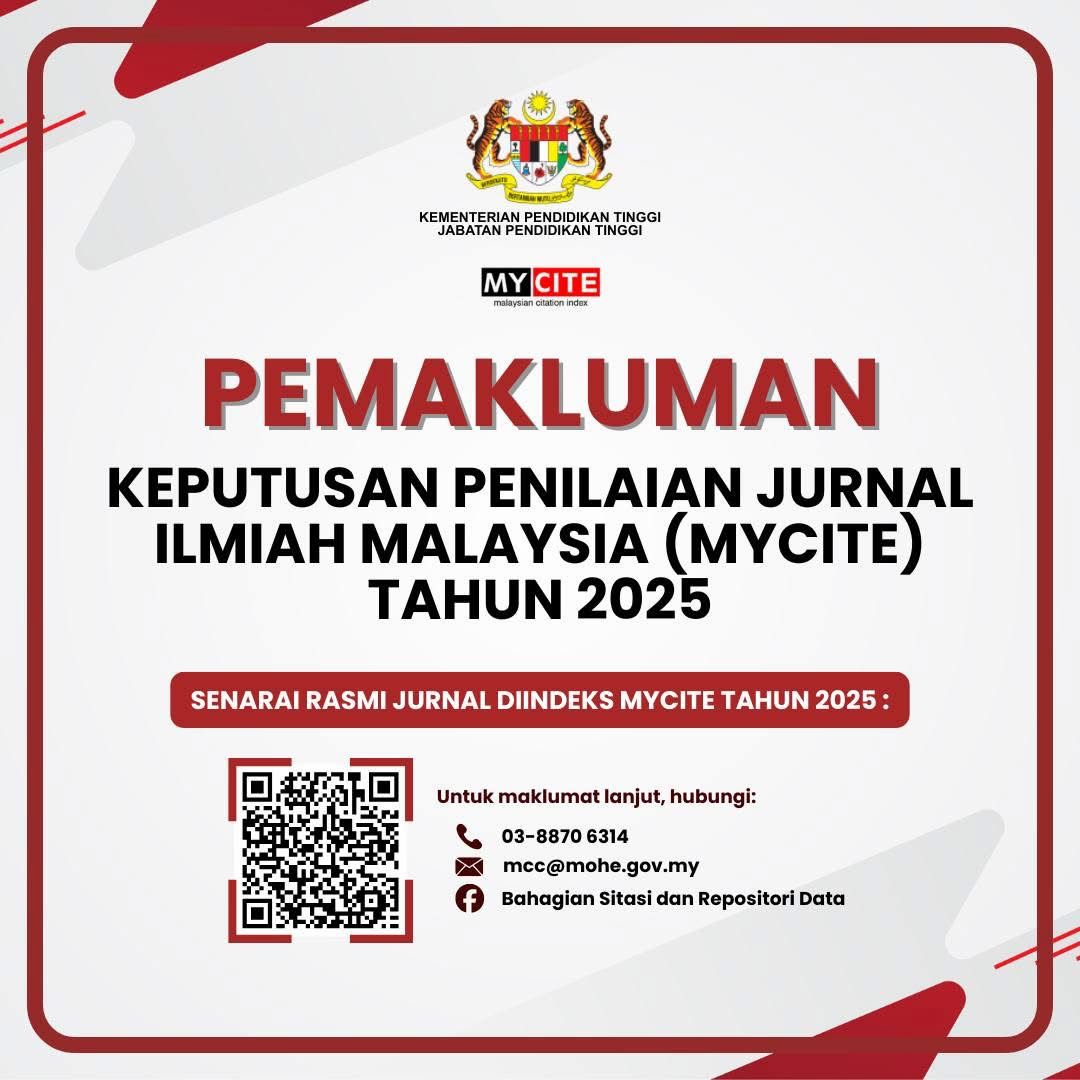The Relationship Between Family Involvement And The Degree Of Self-Regulated Learning Among Students Of Communicative Malay Literature
DOI:
https://doi.org/10.24191/idealogy.v10i2.670Keywords:
Self-Regulated Learning, Parental Involvement, Ecology Social, Communicative Malay LiteratureAbstract
The study seeks to examine the relationship between familial involvement and the degree of self-regulated learning among sixth form students enrolled in the Communicative Malay Literature course. The research employed a quantitative approach through a survey using a validated and reliable questionnaire instrument, as assessed by specialists. The Self-Regulation Level (SRL) of students was evaluated with a questionnaire adapted from the Motivated Strategies for Learning Questionnaire (MSLQ). Meanwhile, familial influence pertinent to involvement was measured using the Parental Authority Questionnaire and the Perception of Parents Scales (POPS). A total of 100 respondents of the study who are Sixth Form students enrolled in a Malay Literature course at school. Descriptive analysis, inference, and correlation were employed to test the research questions utilizing the Statistical Package for the Social Sciences (SPSS) for Windows version 25.0 software. The findings of this study showed a significant correlation between self-regulated learning (SRL) and parental participation. Family participation consists of a number of aspects–collaborative involvement, educational approach, and learning environment–that influence the degree of student self-regulated learning. This study is grounded in Bronfenbrenner's Theory of Social Ecology (1979, 1986), which examines two fundamental layers of relationships between individuals and students: the microsystem and the mesosystem. Families may cultivate students who are more proficient and capable of making autonomous judgments. This study demonstrates that parental influence on self-regulation learning extends beyond elementary education to include higher education, specifically in the sixth form.
References
Aldhafeeri, F. M., & Alotaibi, A. A. (2023). Reimagining Education for Successful and Sustainable Digital Shifting. SAGE Open, 13(1), 215824402311544.
https://doi.org/10.1177/21582440231154474
Anugrah, D., Novel, P. P., & Ma’rufi, M. (2022). Self Regulated Learning, Parental Monitoring Dan Kemampuan Berpikir Kritis. Pedagogy: Jurnal Pendidikan Matematika, 7(2), 189-198. https://doi.org/10.30605/pedagogy.v7i2.2153
Astriani, N. (2019). Pengaruh ibu bekerja dan peran ayah terhadap prestasi belajar anak. Jurnal Pendidikan Luar Sekolah, 13(1), 44–51. https://doi.org/10.32832/jpls.v13i1.2778
Awang, M. M., Khairuddin, K. F., Ahmad, A. R., Ghani, S. A., & Mamat, R. M. S. R. (2022). Ketidakhadiran ke sekolah: Faktor penyebab, aktiviti ketika ponteng dan aspirasi budaya belajarpelajar Orang Asli. Malaysian Journal of Learning and Instruction, 19(1), 227-308. https://doi.org/10.32890/ mjli2022.19.1.10
Azam, S. B. M., & Abd Razak, N. M. A. (2020). Terapi Pelbagai Sistem Dalam Program Pemulihan Berasaskan Keluarga Untuk Kanak-Kanak Yang Berkonflik Dengan Undang-Undang; Kertas Konseptual. The Malaysian Journal Of Social Administration, 14(1), 115-137.
Cory, M., Johnston, B., & Nelson, D. (2021). A Student-Driven Community Engagement Model for School Nutrition Education Programs. The Journal of school health, 91(12), 1024–1029. https://doi.org/10.1111/josh.13091
De La Fuente, J. M., Peralta-Sánchez, F. J., Martínez-Vicente, J. M., Sander, P., Garzón-Umerenkova, A., & Zapata, L. (2020). Effects of Self-Regulation vs. External Regulation on the Factors and Symptoms of Academic Stress in Undergraduate Students. Frontiers in Psychology, 11
https://doi.org/10.3389/fpsyg.2020.01773
Del Carmen Pérez Fuentes, M., Del Mar Molero Jurado, M., Del Pino, R. J., & Linares, J. J. G. (2019). Emotional intelligence, self-efficacy and empathy as predictors of overall self-esteem in nursing by years of experience. Frontiers in Psychology, 10.
https://doi.org/10.3389/fpsyg.2019.02035
El-Amin, A. (2020). Andragogy: A Theory in Practice in Higher Education. Journal of Research in Higher Education, 4(2), 54–69. https://doi.org/10.24193/JRHE.2020.2.4
Fullan, M., Hill, P., & Rincón-Gallardo, S. (2017). Deep Learning: Shaking the Foundation. Ontario, Canada: Fullan, M., Quinn, J., & McEachen, J. Retrieved from http://npdl.global/wp-content/uploads/2017/03/npdl- case_study_3.pd
Gatanagayan, T., & Amzah, F. (2021). Modul Kadimel: Reka bentuk pembangunan modul pembelajaran kosa kata yang lebif Afdal. Malaysian Journal of Social Sciences and Humanities (MJSSH), 6(12), 109–124. https://doi.org/10.47405/mjssh.v6i12.1184
Gemma Tur, Linda Castañeda, Ricardo Torres-Kompen & Jeffrey P. Carpenter (2022) A literature review on self-regulated learning and personal learning environments: features of a close relationship, Interactive Learning Environments,
DOI: 10.1080/10494820.2022.2121726
Guven, U. (2009). The influence of the Hosford exponent on the critical major strain of a sheet metal. Proceedings of the Institution of Mechanical Engineers, Part B: Journal of Engineering Manufacture, 223(4), 409–412.
https://doi.org/10.1243/09544054JEM1403
Gosman, M., Nazarudin, M. N., Noordin, Z., Saharin, A., & Saili, S. A. (2020). Hubungan penglibatan ibu bapa dan peranan guru dengan pencapaian akademik pelajar sekolah. International Research Journal of Education and Sciences (IRJES). https://eprints.ums.edu.my/27555/
Hikmat, R., Hermayanti, Y., Praptiwi, A., & Putri, A. M. (2022). Self-regulated Learning Among Undergraduate College Students with Parental Divorce. Jendela Nursing Journal, 6(2), 78–84. https://doi.org/10.31983/jnj.v6i2.9164
Husaini, M. (2022). Teori–Teori Ekologi, Psikologi Dan Sosiologi Dalam Menciptakan Lingkungan Pendidikan Islam. Darul Ulum: Jurnal Ilmiah Keagamaan, Pendidikan dan Kemasyarakatan, 13(1), 116-137.
Lasan, C., & Mahamod, Z. (2018). Pembelajaran Timbal Balik Bahasa Melayu dalam Kalangan Murid Peribumi Bidayuh di Sarawak (Malay Language Reciprocal Learning among Bidayuh Indigenous Pupils in Sarawak). Jurnal Pendidikan Malaysia, 43(02), 1–15. https://doi.org/10.17576/jpen-2018-43.02-01
Mei, F., Mydin Kutty, F. and Othman, N. (2021) “Penglibatan Ibu bapa dan Efikasi Kendiri Murid Sekolah Menengah dalam Membuat Keputusan Kerjaya”, Malaysian Journal of Social Sciences and Humanities (MJSSH), 6(9), pp. 230 - 240. doi: 10.47405/mjssh.v6i9.1023.44–51. https://doi.org/10.32832/jpls.v13i1.2778
Micheal Fullan, M. L. (2014). A Rich Seam How New Pedagogies Find Deep Learning (Issue January).
Miller, K. M., Arellanes, J. A., & James, L. (2022). Support Father engagement: What can we learn from fathers? Journal of Family Diversity in Education, 4(2).
https://doi.org/10.53956/jfde.2022.151
Mohd Effizan Wahid, Mohd Mahzan Awang, A. R. A. A. A. (2019). Children’s Self-Regulated Learning Based-Experience through Environment and Culture Rural Community Sarawak. In N. N. Noorlela Noordin (Ed.), Sustainable Development and Societal Wellbeing in The Current Technological Era (pp. 130–134). Redwhite Pres. https://doi.org/10.32698/GCS.0184
Mohd Khir, A., Mohd Kassim, A. F., & Afiq Zaharim, M. Z. (2019). Motivasi Membaca, Persekitaran Membaca di Rumah dan Sikap Membaca dalam kalangan Pelajar di Universiti Putra Malaysia (UPM). Malaysian Journal of Social Sciences and Humanities (MJSSH), 4(6), 92 - 100. https://doi.org/10.47405/mjssh.v4i6.268
Mohd Majid Konting (1998) Kaedah Penyelidikan Pendidikan Kuala Lumpur, Dewan Bahasa dan Pustaka
Muhammad, N., & Mydin Kutty, F. (2021). Hubungan Antara Pembelajaran Regulasi Kendiri dan Motivasi Terhadap Pencapaian Akademik. Malaysian Journal of Social Sciences and Humanities (MJSSH), 6(9), 215 - 229. https://doi.org/10.47405/mjssh.v6i9.1006
Ng, L. Y. A. (3-5 Sept 2007b). Children’s beliefs about intelligence: A mixed method study. Paper presented at the Refereed proceedings in the 4th international Qualitative research convention Malaysia (QRAM): Doing qualitative research, processes, issues, and challenges, Selangor, Malaysia
Nyutu, E. N., Cobern, W. W., & Pleasants, B. A-S. (2021). Correlational study of student perceptions of their undergraduate laboratory environment with respect to gender and major. International Journal of Education in Mathematics, Science, and Technology (IJEMST), 9(1), 83-102. https://doi.org/10.46328/ijemst.1182
Pinquart, M., & Kauser, R. (2018). Do the associations of parenting styles with behavior problems and academic achievement vary by culture? Results from a meta-analysis. Cultural diversity & ethnic minority psychology, 24(1), 75–100. https://doi.org/10.1037/cdp0000149
Pintrich, P. R., Smith, D. A. F., Garcia, T., & Mckeachie, W. J. 1991. A manual for the use of the motivated strategies for learning Questionnaire (MSLQ). University of Michigan: National Center for Research to Improve Postsecondary Teaching and Learning
PISA 2018 Results (Volume V). (2020). OECD. https://doi.org/10.1787/ca768d40-en
Ramalingam, S., Maniam, M., & Karuppanan, G. (2019). Penglibatan ibu bapa dalam pencapaian akademik pelajar Sekolah Tamil di Selangor (Parents involvement in Selangor Tamil School students’ academic achievement). Muallim Journal of Social Sciences and Humanities. https://doi.org/10.33306/mjssh24
Richey, R. C., Klein, J. D., & Nelson, W. a. (2004). Developmental research: Studies of instructional deisgn and development. Handbook of Research for Educational Communications and Technology, 1099–1130.
Saminathan, C., Yin, L.P.,Mustafa, Z., & Abdullah, A. (2020). Teacher’s Challenges in Implementing the Highly Immersive Prograamme (HIP) in the Classroom, LEARN Journal; Language Education And Acquisition Research Network.
Samuel Zinabu Desta, Mulugeta Awayehu Gugssa, (2022) “ The Implementation of Andragogy in the Adult Education Program in Ethiaopia”, Education Research International, Vol 2022, https://doi.org/10.1155/2022/2028248
Saputri, D. I., Siswanto, J., & Sukamto, S. (2019). Pengaruh Perhatian Orang Tua dan Motivasi Terhadap Hasil Belajar. Jurnal Pedagogi Dan Pembelajaran, 2(3), 369–376.
https://doi.org/10.23887/jp2.v2i3.19285
Suárez, S.; Suárez, J.M. (2019) Las estrategias de aprendizaje y las metas académicas en función del género, los estilos parentales y el rendimiento en estudiantes de secundaria. Rev. Complut. Educ. 30, 167–184. 91.
Termize, M., Mohd, R., & Zamri, A. (2021). Tahap Sokongan Ibu Bapa Dalam Membantu Pembelajaran Murid B40 Di Sekolah Luar Bandar. Jurnal Dunia Pendidikan, 3(1), 707-717. Retrieved from https://myjms.mohe.gov.my/index.php/jdpd/article/view/12965
Trickett, J., Batchelor, S., Brittle, B., Foulkes, M., Pickering, J., Slocombe, F., & Gilmore, C. (2022). The role of parent-led and child-led home numeracy activities in early mathematical skills. Cognitive Development, 63, 0–13.
https://doi.org/10.1016/j.cogdev.2022.101189
Tur-Porcar, A. M. , Jiménez-Martínez, J. , and Mestre-Escrivá, V. (2019). Substance Use in Early and Middle Adolescence. The Role of Academic Efficacy and Parenting. Psychosocial Intervention, 28, 139 - 145. https://doi.org/10.5093/pi2019a11
Tur, G., Castañeda, L., Torres-Kompen, R., & Carpenter, J. P. (2022). A literature review on
self-regulated learning and personal learning environments: features of a close relationship. Interactive Learning Environments, 1–20
https://doi.org/10.1080/10494820.2022.2121726
Wahid, M. E., & Ain, R. (2023). Theoritical Implementation as Folklore Digital Reconstruction in Malay Literature Education. Idealogy Journal. https://doi.org/10.24191/idealogy.v8i2.447
Xie, H., Li, Y., Xia, H., Xuan, C., & Wang, J. (2014). Transient electromagnetic topology method for complex wiring consisting of random and nonuniform transmission lines. In Progress in Electromagnetics Research
Yusoff, Z. J. M., Omar, M. C., & Don, Y. (2021). The Environment Of Effective And Ineffective Schools In Malaysia [Persekitaran Sekolah Berkesan Dan Sekolah Kurang Berkesan Di Malaysia]. Global Journal Of Educational Research And Management, 1(1), 42-57.
Zimmerman, B. J. 1989b. Model of self-regulated learning and academic achievement. Dalam B.J. Zimmerman & D.H Schunk (Eds), Self-regulated learning and academic achievement: Theory, research and practice, progress in cognitive development research. New York: Springer-Verlag
Downloads
Published
Issue
Section
License
Copyright (c) 2025 UiTM Press

This work is licensed under a Creative Commons Attribution-NonCommercial-NoDerivatives 4.0 International License.
UiTM Press (the Publisher) has agreed to publish the undersigned author’s paper in Idealogy Journal. The agreement is contingent upon the fulfilment of a number of requirements listed below.
1. The undersigned author warrants that the paper entitled below is original, that it is not in any way libellous or unlawful in Malaysia, that it does not infringe any copyright or other proprietary right. The undersigned hereby represents and warrants that he/she is the author of the paper, except for material that is clearly identified as to its original source, with permission notices from the copyright owners where required. The undersigned represents that he/she has the power and authority to sign and execute this agreement.
2. The undersigned author warrants that the paper entitled below has not been published elsewhere, and also it will not be submitted anywhere else for publication prior to acceptance/rejection by this Journal.
3. By submitting the paper entitled below, the undersigned author agrees to transfer the rights to publish and distribute the paper in an international e-journal (entitled above) to Publisher.
4. The undersigned author agrees to make a reasonable effort to conform to Publisher's submission guidelines and to liaise with the editor to ensure that the requirements of these guidelines are met to a reasonable degree.
5. The corresponding author signs for and accepts responsibility for releasing this material on behalf of any and all coauthors. This agreement is to be signed by at least one of the authors who has obtained the assent of the co-author(s) where applicable. After submission of this agreement signed by the corresponding author, changes of authorship or in the order of the authors listed will not be accepted.




